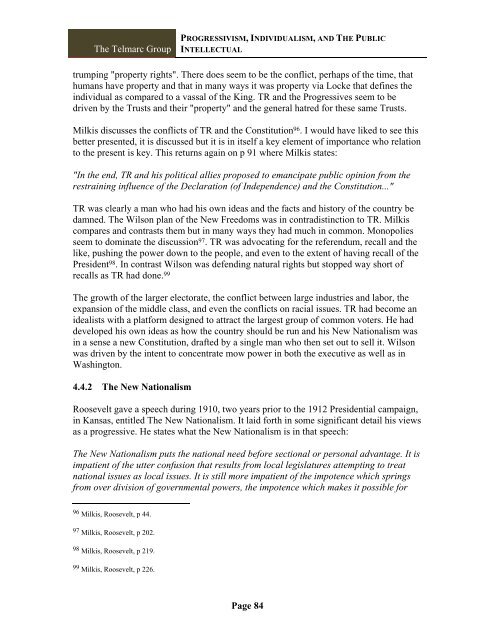progressivism, individualism, and the public ... - Telmarc Group
progressivism, individualism, and the public ... - Telmarc Group
progressivism, individualism, and the public ... - Telmarc Group
Create successful ePaper yourself
Turn your PDF publications into a flip-book with our unique Google optimized e-Paper software.
The <strong>Telmarc</strong> <strong>Group</strong><br />
PROGRESSIVISM, INDIVIDUALISM, AND THE PUBLIC<br />
INTELLECTUAL<br />
trumping "property rights". There does seem to be <strong>the</strong> conflict, perhaps of <strong>the</strong> time, that<br />
humans have property <strong>and</strong> that in many ways it was property via Locke that defines <strong>the</strong><br />
individual as compared to a vassal of <strong>the</strong> King. TR <strong>and</strong> <strong>the</strong> Progressives seem to be<br />
driven by <strong>the</strong> Trusts <strong>and</strong> <strong>the</strong>ir "property" <strong>and</strong> <strong>the</strong> general hatred for <strong>the</strong>se same Trusts.<br />
Milkis discusses <strong>the</strong> conflicts of TR <strong>and</strong> <strong>the</strong> Constitution 96 . I would have liked to see this<br />
better presented, it is discussed but it is in itself a key element of importance who relation<br />
to <strong>the</strong> present is key. This returns again on p 91 where Milkis states:<br />
"In <strong>the</strong> end, TR <strong>and</strong> his political allies proposed to emancipate <strong>public</strong> opinion from <strong>the</strong><br />
restraining influence of <strong>the</strong> Declaration (of Independence) <strong>and</strong> <strong>the</strong> Constitution..."<br />
TR was clearly a man who had his own ideas <strong>and</strong> <strong>the</strong> facts <strong>and</strong> history of <strong>the</strong> country be<br />
damned. The Wilson plan of <strong>the</strong> New Freedoms was in contradistinction to TR. Milkis<br />
compares <strong>and</strong> contrasts <strong>the</strong>m but in many ways <strong>the</strong>y had much in common. Monopolies<br />
seem to dominate <strong>the</strong> discussion 97 . TR was advocating for <strong>the</strong> referendum, recall <strong>and</strong> <strong>the</strong><br />
like, pushing <strong>the</strong> power down to <strong>the</strong> people, <strong>and</strong> even to <strong>the</strong> extent of having recall of <strong>the</strong><br />
President 98 . In contrast Wilson was defending natural rights but stopped way short of<br />
recalls as TR had done. 99<br />
The growth of <strong>the</strong> larger electorate, <strong>the</strong> conflict between large industries <strong>and</strong> labor, <strong>the</strong><br />
expansion of <strong>the</strong> middle class, <strong>and</strong> even <strong>the</strong> conflicts on racial issues. TR had become an<br />
idealists with a platform designed to attract <strong>the</strong> largest group of common voters. He had<br />
developed his own ideas as how <strong>the</strong> country should be run <strong>and</strong> his New Nationalism was<br />
in a sense a new Constitution, drafted by a single man who <strong>the</strong>n set out to sell it. Wilson<br />
was driven by <strong>the</strong> intent to concentrate mow power in both <strong>the</strong> executive as well as in<br />
Washington.<br />
4.4.2 The New Nationalism<br />
Roosevelt gave a speech during 1910, two years prior to <strong>the</strong> 1912 Presidential campaign,<br />
in Kansas, entitled The New Nationalism. It laid forth in some significant detail his views<br />
as a progressive. He states what <strong>the</strong> New Nationalism is in that speech:<br />
The New Nationalism puts <strong>the</strong> national need before sectional or personal advantage. It is<br />
impatient of <strong>the</strong> utter confusion that results from local legislatures attempting to treat<br />
national issues as local issues. It is still more impatient of <strong>the</strong> impotence which springs<br />
from over division of governmental powers, <strong>the</strong> impotence which makes it possible for<br />
96 Milkis, Roosevelt, p 44.<br />
97 Milkis, Roosevelt, p 202.<br />
98 Milkis, Roosevelt, p 219.<br />
99 Milkis, Roosevelt, p 226.<br />
Page 84












